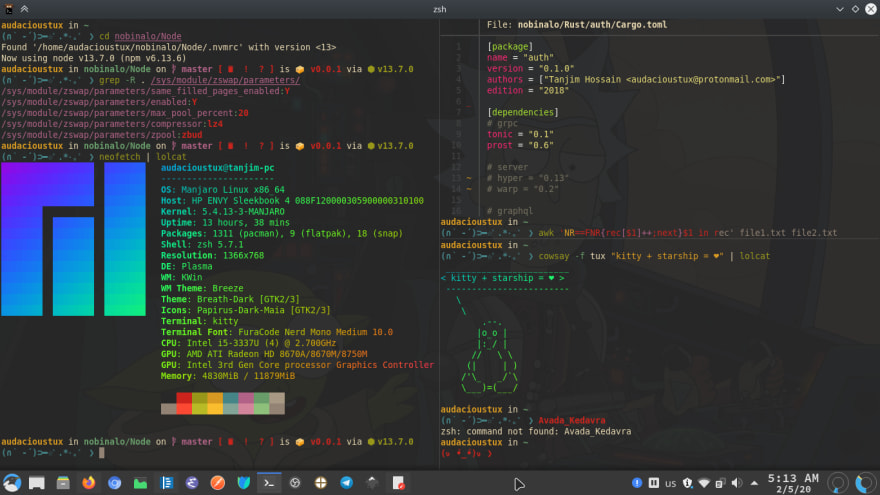If you're just as much of a fan of personalizing your coding environment as I am, you must have been just as bummed out when you ran your Linux environment without a GUI and found out there was no real 'theming' going on in your terminal. No worries, there is hope!
In this blog, I'll explain how you can change the terminal's prompt to look just the way you want to.
What is the PS1 variable?
When looking at our terminal we can see the command prompt. Depending on your system it will have some information in there. In the case of a standard Raspberry Pi it might look something like this:
pi@raspberrypi:~ $
The part pi@raspberrypi:~ $ is actually a shell variable called PS1. There are actually five of these variables. PS0, PS1, PS2, PS3, PS4. Each of them is set up in a different way. To find out more about these variables you can look it up in the manual 📖 ($ man bash) underneath Shell Variables.
How is PS1 set up?
We can see how the variable is set up by typing
$ echo $PS1
This will return \\u@\\h:\\W\\a\\] $ in our example. The characters here actually represent a few things.
The PS1 variable in our example consists of:
- \u = pi - the username
-
@ - the character
@ - \h = raspberrypi - the hostname
-
: - the character
: - \W = ~~ - the current working directory
- \a] - an ASCII bell character
- ** $** - a space and the
$character
There are many of these characters that you can use. It's easy to find them by opening the bash manual (man bash) and searching for PROMPTING. It will give you a list of available backslash-escaped special characters.
We can change this variable very easily. Let's set it up to only show the username and current working directory:
$ PS1=\"\\u [\\w]: \"
Using colors
We can also use different colors in our Prompt. To check out what options we have, we can find them using man terminal colors. You'll find a list of available colors there:
0 to restore default color
1 for brighter colors
4 for underlined text
5 for flashing text
30 for black foreground
31 for red foreground
32 for green foreground
33 for yellow (or brown) foreground
34 for blue foreground
35 for purple foreground
36 for cyan foreground
37 for white (or gray) foreground
40 for black background
41 for red background
42 for green background
43 for yellow (or brown) background
44 for blue background
45 for purple background
46 for cyan background
47 for white (or gray) background
We can set a foreground and background color for our prompt. For example, let's turn the background purple and the foreground a white color.
Inside your terminal type:
$ PS1=\"\\e[45;37m\\ \\u [\\w]:\\e[0m \"
Let's look at the first part \\e[45;37m.
-
\\e[tells bash that we are giving new color information -
45the background color purple -
;just a separation between the colors -
37the foreground color white -
mindicates the end of the color definitions
Knowing this, we can also see that the end part \\e[0m resets everything back to default. To see what happens if we keep this out, try setting it without the end part.
Now for the last personalization...
Using special characters
Let's spice it up a bit more by adding a few more bits and bobs. (Get it? bits? No? Alrighty...).
I want to use a few special characters to give a fading look, ▓, ▒ and ░. In order to include these in the PS1 variable, we're going to need their octal numbers. I used Graphemica.com to find the octal numbers.
- ▓ =
\\342\\226\\223 - ▒ =
\\342\\226\\222 - ░ =
\\342\\226\\221
When we want to put them together we just chain the numbers: \\342\\226\\223\\342\\226\\222\\342\\226\\221. We also want to set the right colors. So we'll turn the foreground color purple and the background color back to default by adding \\e[0;35m. We add this right after the working directory character as such:
$ PS1=\"\\e[45;37m \\u [\\w]\\e[0;35m\\342\\226\\223\\342\\226\\222\\342\\226\\221:\\e[0m \"
This will set up us with something looking like this:
Of course, there are other creative things you can do and other characters you can use.
Setting it in your bash files
Now that we have something fun set up, let's make sure it is permanent. You can do this by setting this variable in your ~/.bashrc or ~/.bash_profile:
PS1="\e[45;37m \u [\w]\e[0;35m\342\226\223\342\226\222\342\226\221:\e[0m"
And that's it! This way, your prompt will look this way, even if you restart your computer.
I'm really curious about other awesome ways there are to personalize the terminal. And also to see what types of combinations people can come up with to personalize their prompt, so please share your creations!






Top comments (4)
Good intro, especially with the custom characters / colors.
Once you decide that a custom prompt is definitely for you, you may want to consider a more comprehensive prompt framework.
I suggest taking a look at Bash-It
It has a lot of prompt themes to chose from.
Many of the themes support different
segmentsthat you can use to customize your prompt, ie:I'm a huge fan of (and contributor to) the Bash-It Powerline themes, which support many different types of segments, along with the ability to control both the order of segments and their colors.
Nice post!
An if you often use git, you can even add the git status of your current working directory.
github.com/magicmonty/bash-git-prompt
All those ZSH and Fish users, they think they are sooo fancy. pff, we have nice things too.
asciimojis are great too ;)

Yeah those are so fun!